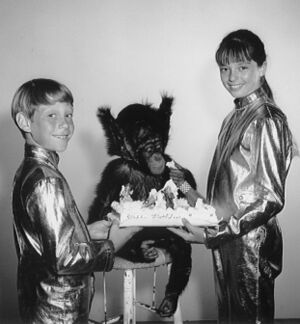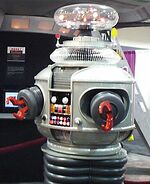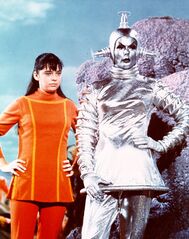Lost in Space
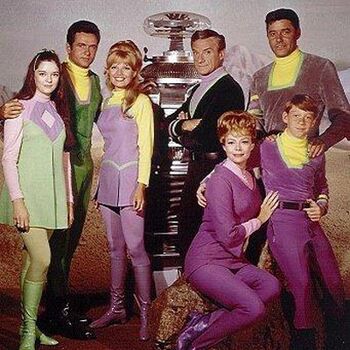
Lost in Space was an American television series produced by Irwin Allen from 1965-1968. The program was known almost as much for its rivalry with Star Trek as for its content, which pushed the limits of both technology and sexuality.
The show focused on the Robinson family, their pilot and their robot who were sentenced to imprisonment in a penal colony on Alpha Centauri for various sex crimes. But due to the actions of their incompetent guard Dr. Smith, they never made it. Instead, they became hunted criminals. They fled from planet to planet, survived numerous crashes, and dealt with dozens of bounty-hunting space aliens bent on capturing them.
While Star Trek fans have continually criticized it, the program won a number of Emmy Awards and Peabody Awards. Many employees of America's National Aeronautics and Space Administration (NASA) credited the show's technical accuracy with sparking their interest in rocket science (some claim NASA was actually based on the program's Alpha Control). And in 2018, The Science Fiction and Fantasy Writers of America named Lost in Space the best American science fiction series of all time.
The first season episode "The War of the Robots", in which the Robinson robot squares off against guest star Robby the Robot (of Forbidden Planet fame) remains the single most highest-rated program in television history.
The Dream[edit]
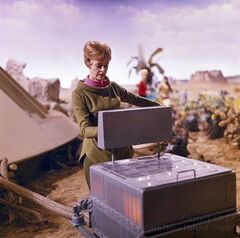
Television producer Irwin Allen heard about the proposed Star Trek television program, which claimed it would be based on extrapolation of modern science and would revolutionize popular Sci-Fi culture. The Star Trek crew also said they planned to push television's sexual limits. The ship would have a crew of half men and half women, and would feature episodes dealing with sexual taboos such as birth control, interracial intimacy, unrepressable sexual urges (Pon farr), human-alien sex, and frequent upskirt shots. But Allen believed its creator, former police sergeant, pilot and aeronautical engineer Gene Roddenbury, lacked the real-world experience and technical knowledge that a television producer such as Allen would have. So Allen decided to produce something more sophisticated, pushing the limits of technology and those of the censors.
His dream for Lost in Space was nothing short of filming it entirely on location with real astronauts, real spacecraft, real alien planets, real aliens and real sex. He originally planned to call the program either Space Family Robinson or Lost Girls, both based on Alan Moore's series of porno-graphic novels. But Moore and comic company Gold Key refused to release either title. This was the first of Allen's legal complications.
He was also forced to compromise on the real aliens and used actors instead, because American union rules prevented him from employing non-terrestrials in acting roles. He also agreed to compromise on using real cosmonauts because American union rules during the Cold War preventing him from employing Russians as actors. The Star Trek Concordance author Bjo Trimble said, "If he knew how the acting was to turn out in the final production, he could probably have gotten around the rules on a technicality."
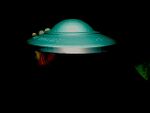
Allen's dream for real spacecraft and real planets persisted. The Jupiter 2 was to be built by no less than Lockheed Martin and his brother, Steve. Alien planets were identified by NASA using advanced optical interferometers. Allen insisted on following strict classification rules which he explained in detail in the NASA-assisted Lost in Space Technical Manual. This specified that "a planet shall be regarded as a massive spherical body that is neither a star nor a film studio."
Unfortunately, due to a computer malfunction in converting metric to imperial measurements, the Lockheed brothers built the Jupiter 2 far too small for it to be operational. Since there was insufficient time left before filming began for a new ship to be built, Irwin Allen decided to drop his dream of a real spacecraft and real alien planets. He instead settled for a wooden mock-up of a spacecraft, polystyrene rocks in a television studio, and human actors in alien costumes recycled from 1930s Saturday morning movie serials. Ironically, this proved fortuitous, for it encouraged Allen to focus on great acting, great writing and great sex.
The Plot[edit]
After months of researching both Eastern and Western classical literature, Allen discovered all plots could be condensed into one. He described this in a 1966 interview with Barbara Walters. Allen said all plots could be reduced to "boy meets girl, boy loves girl, girl loves boy, they marry, have a family, then all get on a ship bound for a new world and end up in a sound studio at 20th Century Fox."
The Episodes[edit]
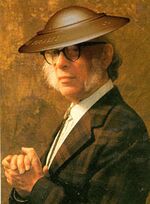
The first episode, "No Place to Hide," features the Robinson family, their pilot and robot leaving Earth on October 16, 1997. Convicted of various sex crimes and other wrongdoings, they are condemned to join a penal colony on Alpha Centauri. Dr. Zachary Smith is the comic relief as the bumbling, lovable guard who sneaks aboard the ship when the family tries to escape and accidentally throws the ship off course.
About the middle of the first season, Allen realized the series needed a new focus "to keep the attention of the sophisticated American viewer." He then made Dr. Smith, who had been a guest star who appeared in every episode, a regular who was listed as a guest star. "I felt this was the change the series needed."
The change worked. The series increased in popularity, and its first season's ratings beat those of Star Trek.
Unfortunately, in season two the baseball docudrama Batman began airing at the same time as Lost in Space. To compete with the serious drama, Dr. Smith was changed from the comic guard to a highly competent medical doctor, environmental control expert, and a United Nations secret agent who pretended to be a comic guard. His mission was to deliver the family, pilot and robot to the penal colony. But his efforts were continually thwarted by the convicts, who were set on escaping and returning to their home on the "shining planet known as Earth."
The show settled into a successful formula that's been followed by virtually every science fiction series made since. Dr. Smith looks for ways to get the Robinsons to prison, and fools Will Robinson into assisting him. The Robot usually accompanies them, warning Will with "Danger, Will Robinson!", questioning Dr. Smith's plans with "That does not compute," and warning everyone with "Warning! Warning!" Dr. Smith responds with "You bubble-headed booby!", which somehow passed by 1960s censors. As a result of some brave effort, Dr. Smith becomes severely injured and cries, "Oh, the pain...the pain!" But he reassures the easily frightened Will, saying, "Never fear, Smith is here!" Pilot Don West and Professor John Robinson uncover Smith's plot to have them incarcerated, and set out to stop him. Penny Robinson comes to help Dr. Smith (in the third season while wearing a mini-dress), while John's wife Dr. Maureen Robinson and daughter Judy bake cookies. At the end of each episode, Professor Robinson tells Will, "Don't do that again, Son." This is followed by a cliffhanger.
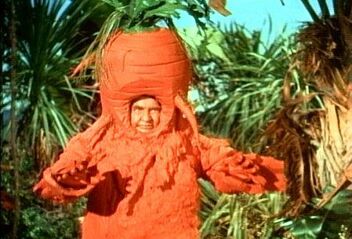
Allen planned a new direction for the series in the fourth season, which was unfortunately never produced. Near the end of season three, Lost in Space became the first American series to seriously deal with unwed pregnancy, although the word "pregnant" was never used. In the series's penultimate episode, "The Great Dildo Rebellion," it is discovered that John and Maureen's daughter is "expecting a baby." At the climax of the episode, Penny delivers.
The final episode was aired as "Junkyard in Space," but was originally titled "Who's the Daddy?" Dr. Smith tries to save Penny's baby, called Debbie the Bloop, and capture the Robinsons. He plans to exchange the infant, whom he believes is in danger thinking she's the product of rape, for seven pairs of used handcuffs with the kindhearted junk dealers Sanford and Son. The plan is thwarted when genetic testing reveals the baby's true father: Penny's brother Will. In the last line of the episode and of the series, Professor Robinson tells Will, "Don't do that again, Son."
Irwin Allen used the show as a showcase for color broadcasting, with vivid purples, greens, and yellows everywhere. While he claimed this was an unintentional factor in the increasing sales of color televisions, his claim was investigated by the Federal Communications Commission. According to a report released in 1968, television sales soared as a direct result of feet, fists, and books going through the screen every time Dr. Smith, pretending to be a bumbler, pressed buttons on an alien machine while saying the line, "Nonsense William, what could possibly go wrong?" Some suspect this was due to a televised mind control device, and believe this investigation was the actual reason for the cancellation of the series. Others believe it was the controversial story line involving Penny and Will that ended the third season, which due to budget constraints was filmed in black and white.
The Music[edit]
The theme music was by John Williams, in his familiar Spanish guitar style. To increase the show's tempo, in the third season he played it faster.
Much of the incidental music in the series was written by Williams and other notable film and television composers, ironically including Alexander Courage, who wrote the theme music for Star Trek.
The Cast[edit]
- Doctor John Robinson: (Guy Williams) The expedition commander and supposed father of the Robinson children. He was convicted of developing a planetary Weapon of Mass Destruction for the Xindi that was called the Death Star, and of being the masked criminal rapist known as Zorro. Williams was fired at the end of the third season when it was discovered he secretly played a masked crime fighter known as Batman.
- Doctor Maureen Robinson: (June Lockhart) John's biochemist wife. She was convicted of operating a house of ill repute that featured young girls and was called Petticoat Junction. Lockhart was later discovered, while wearing costume and heavy makeup, to have played the part of Lassie.
- Major Don West: (Mark Goddard) The military pilot of the Jupiter 2, secret lover of both Judy and John, and true father of the Robinson children. He was convicted of numerous sex crimes and of attempting to kill Dr. Smith 83 times. In real life, Goddard was accused of trying to kill Smith's portrayer Jonathan Harris 83 times.
- Judy Robinson: (Marta Kristen) The oldest child, 18 years old. She was convicted of being a space whore. After playing daughter Judy on a Sci-Fi program for three years, Kristen decided to broaden her career. She was hired as a voice actor on the animated Sci-Fi series The Jetsons, where she played daughter Judy.
- Penny Robinson: (Angela Cartwright) An 11-year-old and Dr. Smith's mate. She is the only one who was wrongly convicted (because of network censorship, her alleged sex crimes were never specified in the series). Cartwright later created the television series Bonanza, which starred the Cartwright family. Penny (possibly played by Cartwright's stunt double Lacey Chabert) also starred in the Preteen Slut series.
- Will Robinson: (Bill Mumy) A 9-year-old child prodigy in electronics. He was convicted of computer hacking and being an electronically-aided "peeping Tom," and was secretly the true saboteur who spoiled all of Dr. Smith's efforts. After appearing as Lennier in several episodes of Babylon 5, Mumy later began his most successful career as a Comic Book Convention guest.
- The Robot: (Bob May, actor), (Dick Tufeld, voice actor, who also provided the voice for Dr. Smith). The Robot is a Model B-9, Class M-3 General Utility Non-Theorizing Environmental Control Vacuum Cleaner. He was convicted of committing cross-species oral sex on Talkie Toaster (because of network censorship, this was referred to as "eating toast".) May and Tufeld were later sued when the Robot was discovered to be a true robot built by Robert Kinoshita with voice by singer-songwriter Bob "Rod" Stewart. He later starred on Red Dwarf and was the father of C3PO. He passed away in 1995, and was recycled as the rear end of the Renault Mégane.
- Doctor Zachary Smith: (Jonathan Harris) A bumbling guard (first season) or a doctor of medicine, expert in Cybernetics, specialist in environmental and intergalactic psychology and secret agent sent to capture the convicts while pretending to be a bumbling guard (second and third seasons). Harris went on to do voice work for several animated programs, including performing all the voices of The Simpsons.
- Debbie the Bloop: (Debbie Mumy-Cartwright) Daughter of Will and Penny Robinson. Mumy-Cartwright appeared occasionally in Lancelot Link and Secret Chimp in the 1970s and on The Chimp Channel in the 1990s. She later retired to Neverland Ranch with her brother Pedobear. Following genetic testing in 2018, she was found to actually be the daughter of Angela Cartwright and Jonathan Harris. Star Trek creator and Lost in Space rival Gene Roddenbury once said "Debbie is more intelligent than the humans on that show and less hairy than their scripts."
The Critics[edit]
Many contemporary critics complained that the show's vision of the future, especially in its sex roles, was unrealistic. But a few decades of progress revealed otherwise. The real-life missions of NASA and the Russian Federal Space Agency demonstrated that it is always men who are responsible for malfunctioning technical equipment and spaceship crashes. Good Housekeeping executive editor Jennifer Cook pointed out that "futuristic women were accurately shown as gleefully pressing buttons on the front of their automatic food processors, hair stylers, and washing machines." And Dateline NBC: To Catch a Predator host Chris Hansen said the show accurately predicted "how preteen girls would finally reach their due recognition as sex objects."
While in retrospect the program is almost universally praised for it's ground-breaking accuracy and treatment of sexual issues, it is continually criticized by Star Trek cast, crew and fans. Star Trek creator Gene Roddenbury said aliens on the show "looked like extras wearing costumes recycled from 1930s Saturday morning movie serials. And when the girls weren't wearing leg-hiding trousers, their dresses were too long--you couldn't see their panties!" Star Trek writer David Gerrold wrote "The Robinsons were out-bumbled (first season) or out-smarted (second and third season) by Dr Smith in every episode, failed to push Dr. Smith out the airlock in every episode, and managed to escape each planet just before it exploded--and it was always the same planet. If I wanted to see the same planet blow up over and over and over again, I'd go to a marathon featuring every remake of the original Star Wars."
In spite of criticism by Star Trek fans, Lost In Space was invariably well compared against that show by TV critics and others. In addition to its American awards, the program was acclaimed internationally. The International Trust of Academic Science and Scientifiction (TITASS) rated it the 3rd Greatest Sci-Fi Gratuitous Sex Program of all time, right behind Holmes and Yo-Yo (2nd) and Fox News (1st). Austra of Australia's Top 100 Sci-Fi TV Shows ranked it as number 1 (Star Trek was number 42).
Unfortunately, the American Lost In Space has suffered in comparisons against British Sci-Fi. British critics have said that the acting, stories, and general quality of the sets were not up to the standards of the greatest and most realistic British Sci-Fi programme of all time, The Clangers.
The Spinoffs[edit]
The program was made into a comic book series, a cartoon, a feature film, a novel and a lunch box. Plans for a second series were canceled when it was decided that modern Computer-generated imagery (CGI) would pale in comparison to the original show's models.
